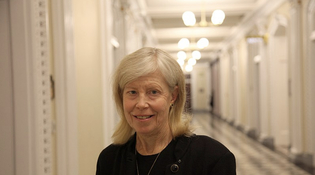
White House Archives
Deborah Rhode at the White House's 2011 Champions of Change event.
View full image
At the age of 31, Deborah Rhode ’74, ’77JD, became the first female Yale College graduate elected to the Yale Board of Trustees. She and her husband, Ralph Cavanagh ’74, ’77JD, arrived at the introductory dinner and found their place cards on the table. Deborah’s card read “Deborah Rhode.” Ralph’s read “Ralph Rhode.” It was 1983, and back then, it was almost a reflex to assume that a wife would take her husband’s surname. Ralph recalls what happened next: Deborah had the “joyous pleasure” of informing the president of Yale that Ralph had decided to keep his last name. (President Giamatti ’60, ’64PhD, to his credit, laughed.)
I’ve known Ralph, the codirector of the clean energy program at the Natural Resources Defense Council (NRDC), for years. I’ve had it in mind for some time that Deborah—a brilliant woman who broke many gender barriers—would be a compelling subject for a feature story in this magazine. But sometimes, the ship sails when you’re looking the other way. Deborah Rhode died on January 8, at the age of 68.
Deborah stood just five feet two and weighed some 90 pounds, but intellectually, she was a colossus. She published more than 30 books and more than 100 law review articles, writing three double-spaced pages a day, every day, for more than four decades. She’s known for almost singlehandedly building the field of legal ethics, and for her extensive work on women’s issues, access to justice, gender and the law, and the teaching of leadership, especially to women. She was the second woman to be tenured at Stanford Law School.
One expects someone of such intellectual intensity to have a retiring, inward personality. But not Deborah. “She conveyed herself as strong, and energetic, and powerful,” says Stanford law professor emeritus Michael Wald ’67MA, ’67LLB.
Deborah had been the high school debate champion in her state of Illinois (seriously challenged only by Merrick Garland). She always debated, says Ralph, with “a steely, quiet strength and a marvelous fluency.” When she and Ralph were law students at Yale, 60 Minutes invited them to join Lowell Weicker ’53 (Deborah) and William F. Buckley Jr. ’50 (Ralph) to face off over a debate on Watergate. Buckley was so impressed with Deborah that he made her a frequent student panelist on his show Firing Line. He once had porn actor Harry Reems and Reems’s attorney Alan Dershowitz ’62LLB on the show; she cross-examined them. Some 30 years later, Dershowitz ducked out of a debate held by the American Association of Law Schools. Deborah played both their parts, crossing back and forth from his lectern to hers.
When she began to teach leadership, Ralph says, she pushed back “at the conventional leadership norms of what it means to command a room—that strong, hierarchical model of leadership.” Instead, she sought alternatives: leadership through empowering others, sharing credit, finding ways to help people to be better and to feel better.
And she was convivial. At Stanford, says Michael Wald, “she would come by and say, ‘Let’s go for a walk,’ and you might take an hour’s walk and talk about a wide range of things that were on her mind.” People looked forward to those invitations. Johanna Wald ’66LLB, senior attorney (retired) at NRDC, remembers how guests at parties would flock to Deborah just to hear her converse. “She radiated a kind of energy. She had an aura about her—eagerness, and outward-facingness, and ready-to-meet-the-world-ness.”
RIP, Deborah Rhode. You are dearly missed.
An earlier version of this essay mistakenly put the year of Deborah Rhode's election to Yale's board as 1985.
 loading
loading